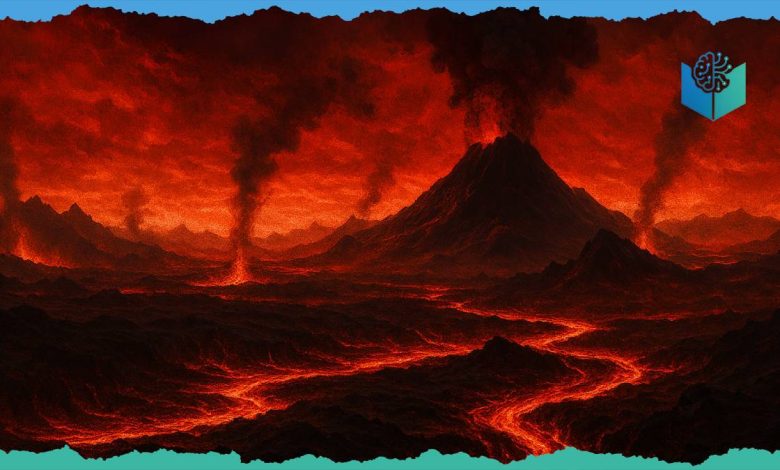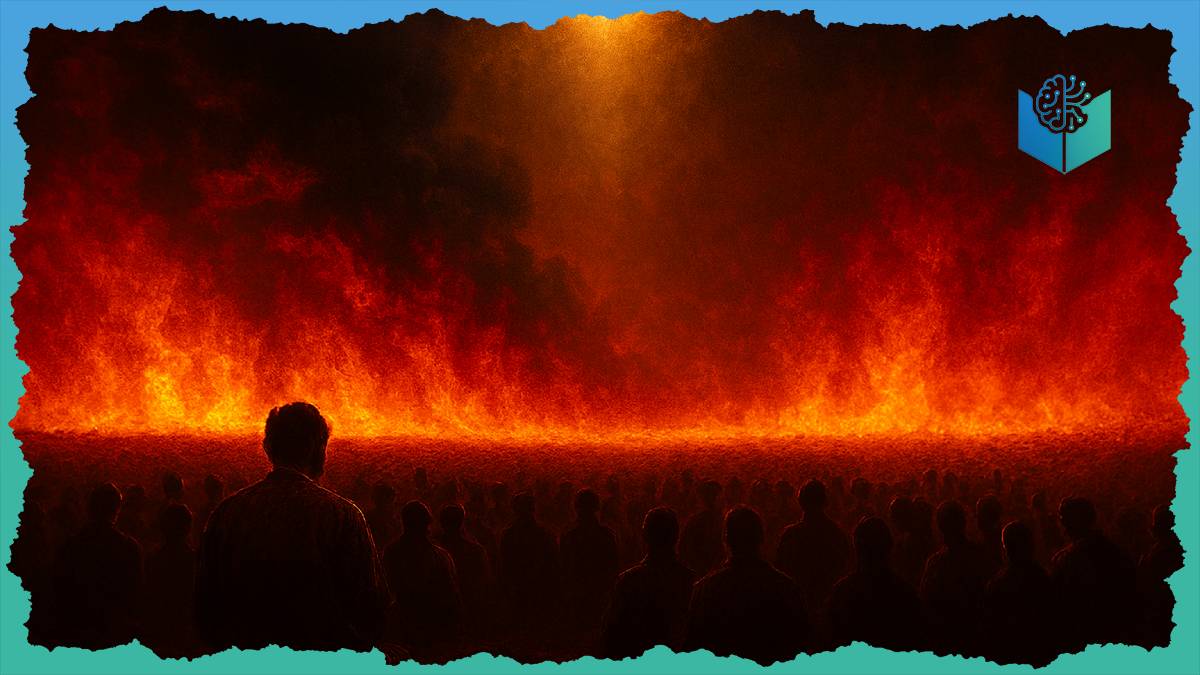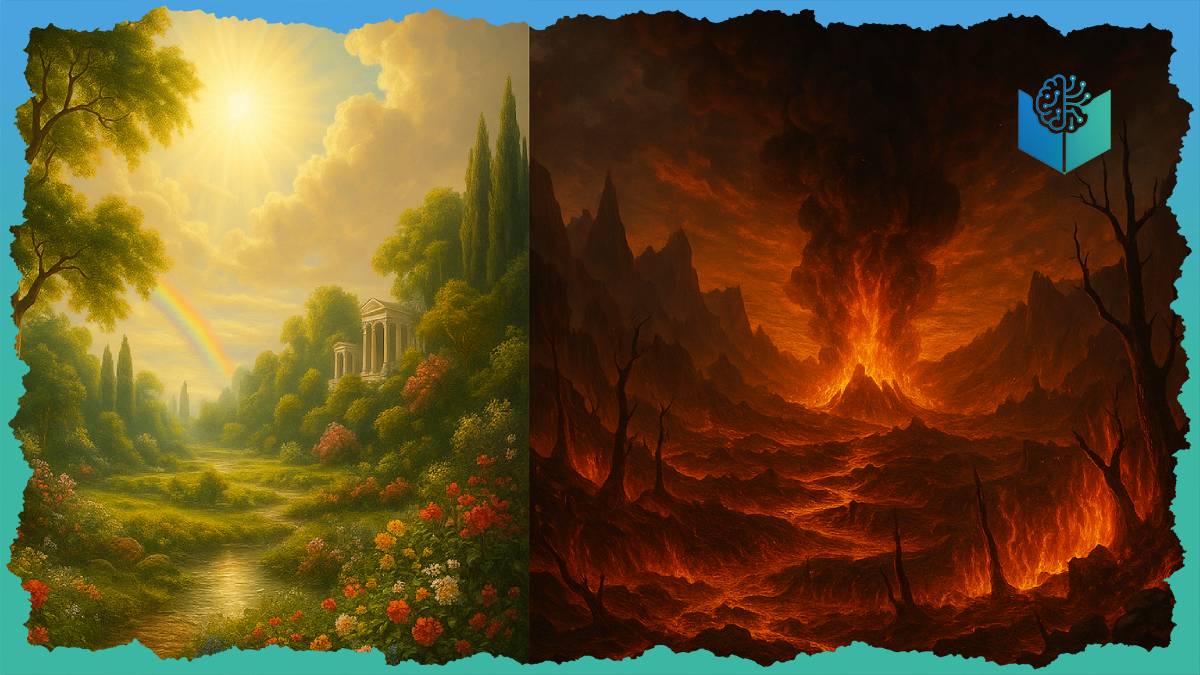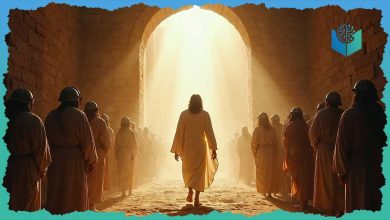Jahannam (Hellfire) in Islam

Hellfire, known as Jahannam in Islam, is described in the Quran as a place of severe punishment for those who reject faith, commit injustice, or turn away from divine guidance. While its descriptions are terrifying, its purpose is deeply moral and spiritual to awaken the human conscience and guide believers toward righteousness.
Understanding Jahannam in the Quran
The Quran paints vivid imagery of Jahannam, not for shock, but as a warning to humanity. Allah says:
“Fear the Fire whose fuel is people and stones, prepared for the disbelievers.” (Quran 2:24)
This verse highlights that Hell is not a random punishment but a consequence of choices made in life. The Quranic story of Hell serves as a mirror, reflecting the results of arrogance, denial, and oppression.
The Purpose of Hell in Islam
The purpose of Hell in Islam goes beyond punishment; it represents divine justice and accountability. Jahannam reminds humanity that every choice has consequences and that no act of oppression, disbelief, or wrongdoing goes unnoticed. The Quran presents Hell not merely as a place of torment but as a moral warning, urging people to reflect on their behavior and return to righteousness before it’s too late.
A Place of Justice and Accountability
In Islamic eschatology, Hell exists as part of divine justice. Every soul will be judged fairly by Allah based on its deeds, intentions, and faith. Jahannam ensures that no wrongdoing goes unanswered, a balance that affirms the perfect justice of Allah.
“Whoever does an atom’s weight of good will see it, and whoever does an atom’s weight of evil will see it.” (Quran 99:7-8)

A Moral Warning for the Living
The mention of Hell in Islam is not only about the afterlife, it’s a lesson for the present. Believers are reminded to act justly, speak truthfully, and live with humility. Through reflection on Jahannam, Muslims learn to value mercy, patience, and repentance.
Descriptions of Jahannam in the Quran
The Quran describes Jahannam in vivid detail, with its blazing fire, scorching winds, and layers of suffering designed to awaken the conscience. It has seven gates, each designated for a specific group of sinners, reflecting the perfect justice of Allah. The punishment in Hell is both physical and emotional, encompassing regret, sorrow, and the awareness of lost chances. These descriptions emphasize moral accountability and the seriousness of turning away from divine truth.
Levels and Gates of Hell
The Quran mentions that Hell has seven gates, each assigned to a group based on their sins (Quran 15:44). These levels symbolize the gravity of actions and the varying degrees of punishment.
Each gate reflects divine precision; those who spread corruption, deny revelation, or oppress others face different consequences, ensuring perfect justice from Allah.
Physical and Emotional Punishments in Hell
Descriptions of punishments in Hell are both physical and emotional. The fire burns intensely, and yet its inhabitants never perish completely. The Quran says:
“Their skins will be replaced so they may taste the punishment.” (Quran 4:56)
But beyond pain, there is regret and sorrow, the torment of knowing the truth too late. This dual suffering teaches that disbelief and injustice have lasting spiritual consequences.

Lessons from Hellfire in Islam
Lessons from Hellfire in Islam encourage believers to lead lives rooted in justice, humility, and faith. Jahannam serves as a reminder of the dangers of arrogance and moral neglect. By contemplating the reality of Hell, Muslims are inspired to purify their intentions, perform good deeds, and seek Allah’s forgiveness. The concept teaches that fear of punishment, balanced with hope in mercy, keeps the believer spiritually aware and morally grounded.
A Reminder of Accountability
Lessons from Hellfire remind believers that actions matter. Even small deeds, whether good or bad, are recorded. Remembering Jahannam encourages Muslims to live consciously, choosing honesty over deceit, compassion over cruelty, and gratitude over arrogance.
Encouragement for Repentance
Despite the severity of Hell’s warnings, Islam emphasizes mercy. Allah repeatedly calls people to repent before it’s too late:
“Say, ‘O My servants who have transgressed against themselves, do not despair of Allah’s mercy. Indeed, Allah forgives all sins.’” (Quran 39:53)
This verse shows that Jahannam’s purpose is not to condemn but to reform. It is a wake-up call urging believers to seek forgiveness and change.
The Relationship Between Heaven and Hell
Heaven and Hell are two sides of divine justice in Islam: Paradise for those who believe and act righteously, and Hell for those who reject truth and commit evil. The Quran contrasts the peace and beauty of Jannah with the torment and despair of Jahannam to illustrate the outcome of human choices. This relationship teaches balance: believers are to hope for Paradise but remain cautious of sin, maintaining sincerity in faith and actions.
Balance Between Hope and Fear
In Islamic belief, the path to faith is balanced between hope in Allah’s mercy and fear of His justice. Reflecting on both Paradise and Hellfire ensures that the heart stays humble and sincere.
The Prophet Muhammad (peace be upon him) taught that true faith lies in maintaining this balance, striving for Paradise but never feeling secure from sin. Jahannam thus strengthens spiritual awareness and responsibility.
Contrast Between Jannah and Jahannam
Just as Jannah (Paradise) is described with gardens, rivers, and peace, Jahannam stands in contrast with fire, thirst, and despair. Together, they complete the Quranic story of moral consequence, teaching that every soul shapes its eternal home through its earthly choices.
Quranic Verses About Hell
The Quran verses about Hell serve as both a warning and a reflection. Some emphasize divine justice, while others highlight mercy and the possibility of repentance.
- Quran 67:6-7: “For those who disbelieve in their Lord is the punishment of Hell, and wretched is the destination.”
- Quran 14:17: “He will drink it but will hardly swallow it, and death will come to him from everywhere, but he is not to die.”
- Quran 35:36: “Those who disbelieve will have the Fire of Hell; it will not be finished with them so they can die, nor will its punishment be lightened.”
These verses from the Quran offer clarity about the spiritual consequences of disbelief and wrongdoing, reinforcing moral awareness.

Hellfire as a Reflection of Human Deeds
In Islam, Hellfire reflects the consequences of one’s own actions and inner state. The Quran shows that those who nurture arrogance, hatred, or corruption in life carry those traits into the Hereafter, where they become sources of suffering. Jahannam is not arbitrary; it mirrors the moral decay that individuals cultivate through disobedience. Thus, living by Quranic principles purifies the heart and protects one from becoming consumed by such inner “fires.”
The Psychological Reality of Jahannam
Beyond its physical reality, Jahannam can also be seen as a reflection of one’s inner state. The arrogance, anger, or greed nurtured in this world become sources of suffering in the next. Thus, the fire symbolizes not just external punishment but the burning of moral corruption.
This perspective aligns with the Quranic lifestyle, which teaches believers to purify the heart and seek peace through remembrance of Allah.
Moral Cleansing Through Reflection
When believers reflect on Hell’s reality, it leads to moral cleansing. The fear of Jahannam motivates one to perform good deeds, help others, and live with empathy. In this way, the very idea of Hell becomes a means of spiritual growth rather than despair.
Repentance and Mercy: Escaping Jahannam
Even with the terrifying warnings of Hell, Islam emphasizes Allah’s infinite mercy. The door to repentance remains open until the final breath. Through sincere repentance, prayer, and good deeds, a person can be forgiven and protected from Jahannam. The Quran assures believers that Allah’s mercy outweighs His wrath, reminding them that Hell exists not to condemn, but to guide hearts back to the path of compassion and faith.
Allah’s Infinite Mercy
Though Jahannam is severe, Allah’s mercy surpasses His wrath. The Quran constantly reminds believers of this truth:
“My mercy encompasses all things.” (Quran 7:156)
This is why Muslims are encouraged to never lose hope. Repentance, prayer, and sincerity can erase sins and protect one from punishment.
The Path to Forgiveness
According to Islam and authentic Quranic teachings, the path away from Hell involves sincere faith, good deeds, and repentance. Acts of charity, kindness, and prayer protect the believer, as Prophet Muhammad taught that even a smile or removing harm from the road is considered a form of charity.
Hellfire in Islamic Eschatology
In Islamic eschatology, Jahannam plays a central role in the final judgment and the balance of divine justice. Some souls will dwell there eternally for their disbelief, while others may enter temporarily for purification before entering Paradise. This understanding highlights Allah’s fairness: every soul is judged precisely according to its deeds. Hell, therefore, is not only a place of punishment but a manifestation of divine wisdom, justice, and mercy intertwined.
The Eternal and the Temporary
In Islamic eschatology, some will remain in Jahannam eternally, those who reject Allah entirely. Others may enter temporarily as purification for their sins before being granted Paradise by Allah’s mercy.
This shows that Hell is not merely punishment but also purification, reflecting divine wisdom and balance.
The Justice and Compassion of Allah
Allah’s justice ensures every soul receives what it deserves, yet His compassion offers redemption. This duality is central to the Islamic worldview: fear encourages righteousness, while mercy inspires hope.
How to Protect Oneself from Jahannam
The Quran and Sunnah guide believers with practical steps to avoid Hellfire:
- Regular prayer and remembrance of Allah.
- Charity and compassion toward others.
- Honesty and humility in all actions.
- Repentance and forgiveness.
By incorporating these values into daily life, Muslims strengthen their relationship with Allah and find peace in the promise of forgiveness.
Final Reflections: Lessons from Jahannam
The reality of Hell in Islam serves as a mirror to the human soul, reminding us of the consequences of arrogance and the value of humility. Jahannam’s descriptions are not to instill despair but to awaken the spirit toward faith, mercy, and justice.
Living with awareness of both Jannah and Jahannam helps maintain balance in a life driven by both love for Allah and fear of wrongdoing.
As the Quran teaches:
“Those who believe and do righteous deeds, they are the companions of Paradise; they will abide therein forever.” (Quran 2:82)
Through this message, believers are encouraged to live by faith, seek mercy, and follow a Quranic lifestyle rooted in reflection, kindness, and devotion.
Conclusion
In summary, the concept of Jahannam in Islam is not only about punishment but about awakening the conscience. It teaches responsibility, inspires repentance, and reminds humanity of divine justice. Platforms like Ayaat.ai and authentic resources about Islam help believers understand these truths deeply, encouraging a life guided by the eternal wisdom of the Quran.
Q&A
What is the 7th level of Hell in Islam?
The seventh and deepest level of Hell is called Jahannam or Hawiyah, reserved for the hypocrites and the most defiant disbelievers.
What is Hell called in Islam?
In Islam, Hell is called Jahannam, described in the Quran as a place of intense punishment for those who reject faith and commit grave sins.
What are the 3 biggest sins in Islam?
The three major sins in Islam are shirk (associating partners with Allah), murder, and disobedience or dishonoring parents.





